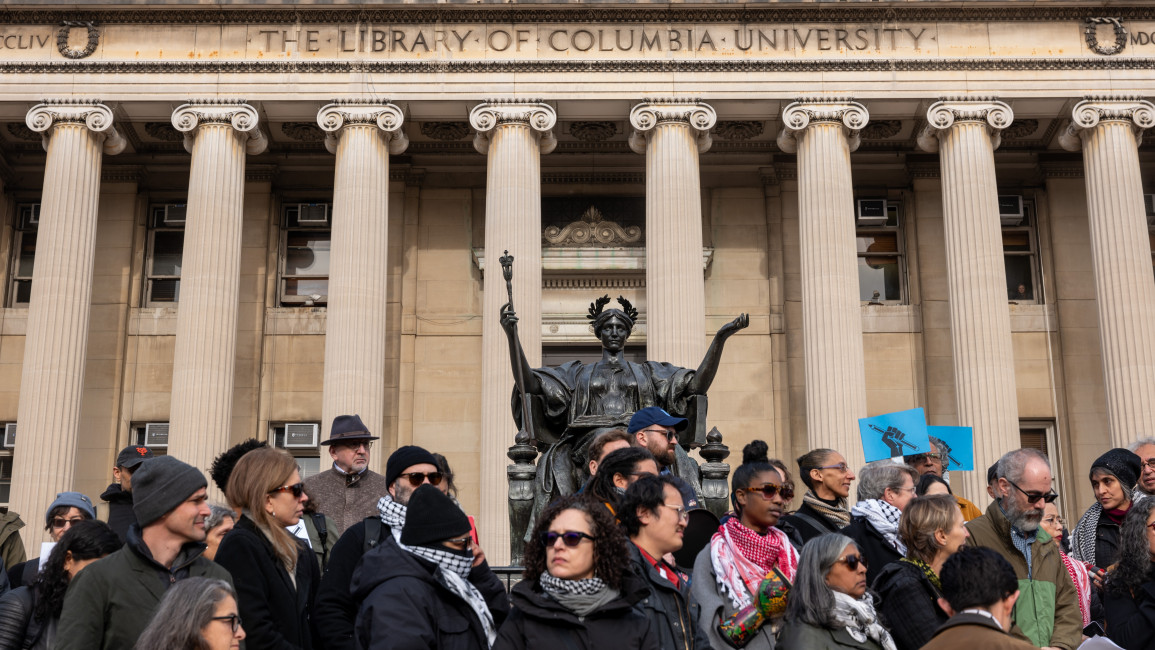Academics in the US self-censor when talking about Israel-Palestine: poll
Academics in the US are self-censoring when speaking about Israel-Palestine issues like criticism of Israel or Washington’s foreign policy, according to a new survey conducted by two politics professors at US colleges.
The Middle East Scholar Barometer survey, based on 936 responses, was conducted last month with Middle East and North Africa academics to gauge expert opinions on Middle East politics in light of Israel's war on Gaza.
The results showed an alarming prevalence of self-censorship among academics in the US and outside the US, and consequently, the shutting down of rhetoric on the Palestine-Israel, which has returned to the forefront of political debate in the West since 7 October.
Among those surveyed in the US, 62 percent said they felt the need to self-censor their conversation when speaking about the Middle East in a professional or academic capacity.
"Eighty-two percent of all U.S.-based respondents, including almost all assistant professors (98 percent), said that they self-censor when they speak professionally about the Israeli-Palestinian issue. Just over 81 percent of those self-censoring said they primarily held back… https://t.co/6ISzpzXFUY
— Shibley Telhami (@ShibleyTelhami) December 6, 2023
The percentage grew when the respondents, which includes professors, graduate students, associate professors, and assistant professors, were asked the same question but related specifically to Israel-Palestine issues: 82 percent answered yes.
Around 70 percent of respondents who are based outside the US said the same.
The majority said that the current Israel-Hamas conflict had amplified the need to censor themselves directly or indirectly on the discourse of the topic.
While student-led demonstrations have been prominent across colleges in the US, authors of the survey said that less attention has been paid to how scholars who teach Middle East affairs have been impacted.
In an article in The Chronicle, a news site for college affairs, they said that the results showed how "the very experts who have dedicated their lives to understanding the region feel the least able to speak about it".
The survey was designed by Marc Lynch, a professor of political science at George Washington University, and Shibley Telhami an American politics professor at the University of Maryland and a Middle East senior fellow at the Brookings Institution. Telhami was born in Israel to a Palestinian family
Despite universities being regarded as beacons of free speech, campuses have been embroiled in toxic political disputes in the weeks since the war broke out which has resulted in the quashing of support for Palestinian self-determination.
When asked on what reasoning do they limit speech about Palestine-Israel, the majority of those surveyed answered with the 'Concerns about pressure from external advocacy group' option.
Other reasons chosen included concerns about the campus culture, offending students, or disciplinary action from administration.
Thousands of protesters have flocked to the US capital Washington DC for a Gaza ceasefire march in Freedom Plaza ⬇️https://t.co/SVsfZX5ltY
— The New Arab (@The_NewArab) November 5, 2023
Since the war between Hamas and Israel began on 7 October, there has been a flurry of student-led demonstrations on US universities in support of both Palestine and Israel with university administrations placing restrictions on the protests.
One protest and counter-protest at Colombia University in New York saw tensions run high with both sides shouting each other down.
Meanwhile, Harvard University’s Palestine Solidarity Committee has faced doxing attacks and death threats, after issuing a statement condemning Israel’s "ongoing annihilation of Palestinians".
The survey also quizzed academics about the presence of racism and different types of prejudice related to the Middle East on their campuses.
Just over 50 percent said that anti-Palestinian sentiments were prevalent "a lot" or "somewhat" at their institution, while 36 percent said the same about anti-Israeli sentiments. In contrast, 18 percent recognised that antisemitism was prevalent – but a distinction often blurred between criticism of Israel and antisemitism.
Anti-Muslim sentiment on campus was felt "a lot" or "somewhat", with 41 percent of respondents selecting these two options.
The US government is Israel’s closest and longest ally and many of the country's top universities have well-documented academic and business ties to the country.



